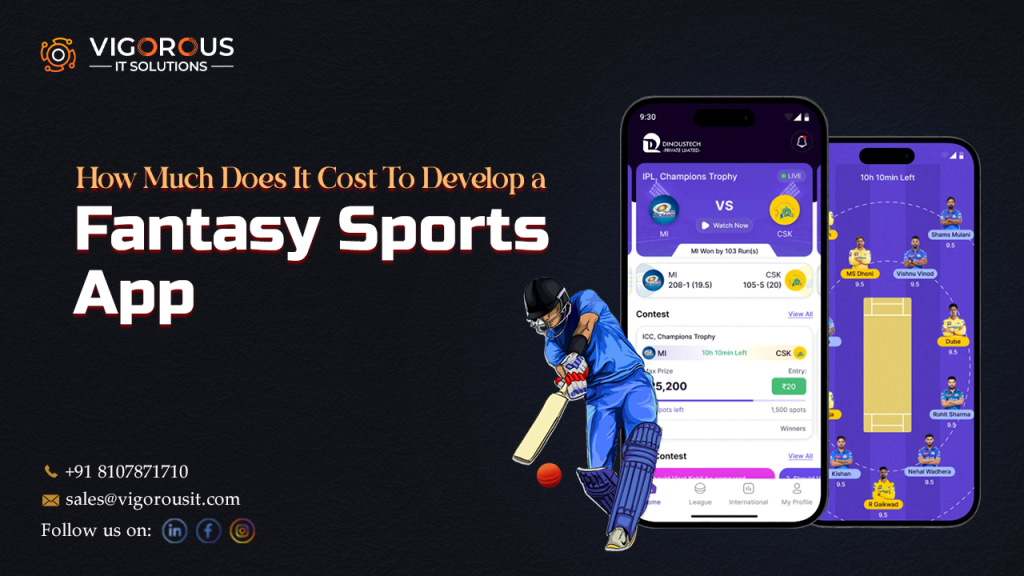Overview
The Fantasy sports industry is flourishing, with the most popular apps such as Dream11 and MPL. With rising startups entering this market, understanding the Cost To Develop A Fantasy Sports app has become essential. The price of developing the app, ranging from its characteristics, features, and design, backend infrastructure, and third-party integration, a few considerations have an effect on the total development budget.
In 2025, fantasy sports apps are no longer just games—they’re multi-million-dollar businesses. According to Statista, the global fantasy sports market is projected to reach $48.6 billion by 2027, growing at a CAGR of 13.9% (2024–2027), with India being one of the fastest-growing markets. This guide provides a complete cost breakdown, regional pricing insights, and smart budgeting tips. If you’re planning to launch a fantasy sports app, this analysis will help you make informed investment and development decisions.
Understanding the Fantasy Sports App Market and Revenue
So, before thinking about costs, you have to comprehend the scope and model of revenue of the fantasy sports ecosystem in 2025:
- By 2025, the fantasy sports business is expected to be worth $38 billion.
- In 2025, India will have more than 180 million fantasy sports players, and the number is expected to grow by 25% per year.
- Cricket, baseball, football, kabaddi, basketball, and esports are included in the Fantasy sports market.
- In-app purchases, entry fees, sponsorships, brand partnerships, and advertisements are transforming into a major source of income.
The fantasy sports apps are not only platforms to play games, but they are a high-revenue-generating ecosystem. These platforms have been turning into real digital companies with integrations like real-time scoreboards, data API, predictive analytics, and crypto wallets.
Let Your Vision Become Reality – Launch Your Software Today!
How Much Does It Cost to Develop a Fantasy Sports App?
The average cost of fantasy sports app development in 2025 will depend on the complexity, the features, and the scalability of the app. A breakdown of the costs based on app type is indicated below:
| Type of Fantasy App | Estimated Development Cost |
| Basic App (MVP) | $20,000 – $35,000 |
| Mid-Level App | $30,000 – $75,000 |
| Advanced App (Full-scale) | $75,000 – $1,20,000 |
Key Factors That Influence Fantasy Sports App Development Cost
The average cost of developing a fantasy sports app in 2025 is affected by several factors. Whether it be what platforms you have selected to implement in the backend infrastructure, every choice can affect your total development budget considerably.
- Platform Selection: Whether it will be iOS, Android, or cross-platform development will have an impact on price and reach. The iOS apps cost a bit less, Android has got broader reach, whereas cross-platform is costly at the beginning but less expensive later.
- Real-time Data Integration: Fantasy apps are built on real-time match statistics. Third-party APIs are essential to provide live scores, player statistics, and certain details of the game, making the experience more competitive and interesting to the users.
- UI/UX Design: It is essential to have an intuitive design with a pleasant and visually appealing interface. An immersive user interface enhances engagement, simplifies navigation, and increases retention and brand perception.
- Admin Dashboard: A powerful administration dashboard that is used to control platform operations. It can manage users efficiently, create contests, follow traces of payments, and track employee performance through effective analytics and reporting tools.
- Backend Architecture: The backend catalyzes your fantasy app. A reliable and fast architecture will support large user loads, give users confidence in data integrity, and provide an easy way to integrate the app with APIs, databases, and external services.
Read Also: How to Build a Fantasy Sports App Like Dream11 in 2025
Key Features That Affect the Development Budget
The price to create a fantasy sports app would mainly depend on the features integrated into the platform. All functions not only guarantee a better user experience, but also add to the overall development budget. The following is a list of the main features that affect the development budget:
- User Registration & Profile Management: This feature enables users to register through email, mobile, or even social media, and has control over personal information which impacts the backend and front-end UI cost.
- Live Match Data Integration: It is a necessary feature to combine live sports data from APIs to provide real-time scoring and game updates. It turns out to be an expensive functionality due to external API licensing and data processing logic.
- Contest Management System: It is a crucial feature that allows users to make or join fantasy competitions. It includes event and prize pools, entry fees, and contest rules, which involve backend complexity, along with an increase in cost.
- Payment Gateway Integration: Allows customers to cash in, cash out, and manage wallets. Adding security, speed, and multi-mode transactions increases both development time and compliance costs.
- Push Notifications and Alerts: Stays active by notifying of matches, contests, and rewards. The backend and integration with services, e.g., Firebase or OneSignal Triggers, are needed but slightly increase development cost.
- Admin Dashboards & CMS: A heavy backend with user management, content control, and analysis tracking that elevates the total number of hours developed and influences the cost structure.
- Advanced Analytics & Reporting: It provides information on user engagement, app usage, and revenue. This feature includes dashboard views and database queries, associated with an admin panel used to view the performance of the app.
- Security Features & Legal Compliance: Comprises user verification, data encryption, anti-fraud, and gaming law compliance. Vital to safeguarding the integrity of apps and preventing the fear of legal repercussions in the regulated market, but it affects the development cost.
Ready To Build Your Own Software Today with Our Expertise!!
Let’s develop an app that helps. Bring your concept to life with our developers. We’re ready to launch!

Hidden Costs to Watch Out for in Fantasy Sports App Development
However, the app development is the focus of the budget; there are still some unexposed costs that are necessary to ensure long-term operation, compliance, and expansion. When these are not taken into account, this can result in some significant roadblocks once the product is launched:
- Sports Data API Subscription: Fantasy apps depend on live data from third-party APIs. Subscriptions usually cost $1000 or more for a month, based on the sports, leagues, and live updates frequency.
- Cloud Hosting & Servers (AWS/GCP): High-quality cloud infrastructure helps you cope with heavy load, traffic, and transactions in the app. Cloud hosting such as AWS can cost between $200 – $2,000/Month, depending on the hosting storage, bandwidth, and scalability requirements.
- App Store & Google Play Fees: Your app must be visible on every platform, although it charges a nominal fee. Google Play Store charges a one-time fee $25, while App Store charges annually $99 for publishing. This enables users to easily download the app, ensuring app credibility and user trust.
- Ongoing Maintenance & Updates: Every app needs updates, fixes bugs, security patches, and new features. Maintenance costs more than 15-20% of the initial development budget of a year, and it ensures stable performance, security, and user satisfaction.
- Legal Compliance & Licensing: Fantasy sports have to be within the legal frameworks that include KYC standards, age restrictions, and regulations on skill-based game designs. It may cost between $2000 – $5000 to hire legal professionals and licensing, depending on the jurisdiction.
- Marketing & User Acquisition: Even the greatest app requires marketing. Effective marketing (ads, influencer campaigns, and referral programs), which can start with 5,000 dollars at MVPs and go beyond that, depending on the ad channels and user acquisition.
Read more: Top 20 Fantasy Sports Apps in India
Monetization Strategies for Fantasy Sports Apps in 2025
Your fantasy sports app requires consistent revenue, but only possible with effective monetization strategies. The following are the most lucrative models in 2025 that you can use to scale your app and generate revenue:
- Entry Fee Contests: This is the major source of revenue for most fantasy apps. Customers seek to enter competitions, and typically, 10%-20% of the prize fund is retained by the platform, ensuring regular revenues are generated from active gameplay.
- In-App Purchases (IAPs): You may sell such features as coins, player stats, or team boosters. Such optional purchases provide a competitive advantage to their users and produce a reliable stream of revenue, with no effect on free users.
- Premium Subscriptions: Provide pay-per-month or pay-per-year offers and offer access without advertising, access to special competitions, and detailed analytics. Subscriptions create a source of recurring revenues and provide increased revenue to serious fantasy players.
- Advertising & Sponsorship: Integrate banner ads, video ads, or sponsored content from AdMob and Google. You can get paid via sponsorships from hosting a particular branded league or event on your app.
- Brand Collaboration & Affiliate Marketing: Partnership with sports brands or betting platforms, and make money from traffic or purchases. You also have the option of encouraging users to follow affiliate links in your app and pay when the user interacts with partner services.
- Merchandise & Fan Store Integration: Offer fans a chance to exchange points or make purchases at your official app to receive fan merchandise, jerseys, and accessories. Not only will this give your app more income, but it will also strengthen the engagement between your fans.
How Vigorous IT Can Help You in Developing a Fantasy App
Vigorous IT Solutions is a top fantasy sports app development company that has been providing customized solutions to startups and big business enterprises around the world. Vigorous IT has demonstrated its capabilities in providing a high-performance gaming app, and here is how it stands out:
Why Choose Vigorous IT Solutions:
- Scalable Architecture.
- Cross-platform Support.
- End-to-End Custom App Development.
- Real-Time Data Integration.
- Compliant and Secure Systems.
“Need expert help estimating your fantasy app cost? Contact Vigorous IT today for a custom quote.”
Conclusion
In 2025, the industry of fantasy sports apps has very strong revenue potential, and innovators can really earn a lot. Even so, they need to depend on strategic planning, cost-sensitivity, and reliable development to grow. It can cost up to $20,000 – $120,000+; it is necessary to know the features, unrevealed charges, and monetization.
Vigorous IT Solutions will assist you in publishing a fully customised, scalable, and legally compliant fantasy sporting application. Our team will provide market readiness and competitiveness in developing, including real-time data integration and a user-friendly design. Partnership with a skilled development company like Vigorous IT will create a competitive edge in this newfound and highly competitive fantasy sports industry.
FAQs
- What is the average cost to develop a fantasy sports app?
- It usually costs between $20,000 to $120,000, depending on the features, platforms, and developer team location.
- How long does it take to develop a fantasy sports app?
- It depends on the complexity or functionalities of the apps; However, usually development is completed within 4 to 12 weeks.
- Which features increase the cost of a fantasy sports app?
- Real-time data, payment systems, cross-platform support, an admin panel, and AI features increase the cost significantly.
- How can I monetize my fantasy sports app?
- You can make money through entry fees, advertising, in-app purchases, subscriptions, and collaborating with brands.
- What Are The Hidden Cost to Build A Fantasy Sports App?
Hidden costs include API subscriptions, server hosting, app store fees, compliance, and ongoing maintenance. —adding $5,000–$20,000+ to the total development budget.

